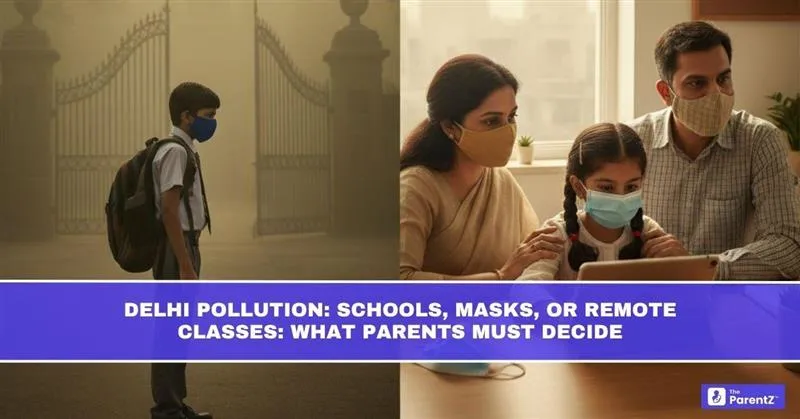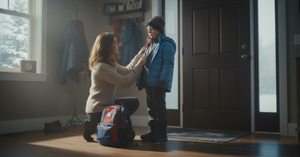Delhi's air has turned dangerous again. If you're a parent in the city, you've probably noticed your child coughing more, complaining about itchy eyes, or feeling tired for no reason. The numbers tell the story: Delhi's Air Quality Index (AQI) hit 354 on Monday (October 10) morning, firmly in the "very poor" zone. Some areas, like Anand Vihar, recorded even worse levels at 379.
This isn't just another pollution spike. It's been going on since Diwali, and parents are left wondering: Do I send my child to school? Should I buy those expensive N95 masks? Or is it safer to keep them home?
What's Actually Happening Right Now
Delhi woke up to thick smog on Monday, with an AQI of 354, marking the season's worst air quality, and temperatures dropping below normal. Several monitoring stations recorded severe pollution: Anand Vihar at 379, ITO at 376, and Chandni Chowk at 360. Even neighboring cities aren't spared. Noida's Sector 62 showed 342, while Gurugram's Sector 51 recorded 327.
Last year, the Supreme Court set 350 as the threshold for GRAP Stage 3, which includes school closures, but despite Delhi's AQI reaching 391, no such measures have been announced yet.
What Does This Mean for Your Child's School?
If GRAP Stage 3 is implemented, state governments may close schools, colleges, and coaching centers, and schools up to Class 5 would shift to a hybrid mode, allowing you to choose between online and in-person classes. But right now, that hasn't happened.
So you're stuck in this gray area where the air is terrible, but schools remain open, and you have to decide.
The Mask Question: Do They Actually Work?
According to health experts, N95 masks are currently the best available protection outdoors. Unlike simple cloth or surgical masks, N95s are designed to block tiny particles like PM2.5; the same fine dust that makes Delhi’s air so dangerous.
Even well-fitted N95 masks cannot filter out gaseous pollutants like ozone, nitrogen dioxide, and carbon monoxide, and exposure still occurs through small leaks or when the mask is removed. They're your best option outdoors, but they're not magic shields.
For children specifically, standard N95 masks may not seal properly on smaller faces, so child-sized respirators or KN95 variants designed for children work better. In Delhi's current hazardous conditions, N95 masks should be replaced every 2 to 3 days with regular outdoor exposure, or immediately if they feel moist, soiled, or hard to breathe through.
How Should Parents Decide?
- Check the AQI daily: When it's above 300, your child is breathing air that's genuinely harmful. Apps and government websites show real-time data for your specific area.
- Assess your child's health: Does your child have asthma, allergies, or any breathing issues? Children, the elderly, and those with lung or heart conditions need stronger protection outdoors, and if breathing becomes labored, it's better to stay indoors with purified air. For these kids, remote learning makes more sense.
- Consider commute time: If your child spends an hour in traffic getting to school, that's an hour of direct exposure. A 10-minute walk is different from a long bus ride through congested areas.
- Look at school facilities: Does the school have air purifiers? Are classrooms well-ventilated or sealed? Some schools are better equipped than others.
- Think about learning quality: Is your child learning well online, or do they struggle without in-person instruction? This matters too.
Conclusion
According to the WHO, air pollution causes an estimated seven million premature deaths each year, with dangerous levels of fine particles prevalent in many cities. This is serious.
There's no perfect answer here. Some parents will choose to send their kids with good N95 masks. Others will keep them home until the air improves. Both decisions are valid.
What's not okay is pretending everything is normal. If you send your child out, invest in proper child-sized N95 masks and replace them regularly. If you choose remote classes, make that choice confidently, as your child's lungs are developing, and this pollution can cause lasting damage.
So, trust your instincts, watch your child's health closely, and don't hesitate to keep them home when the air turns hazardous. No amount of missed school is worth damaged lungs.









Be the first one to comment on this story.